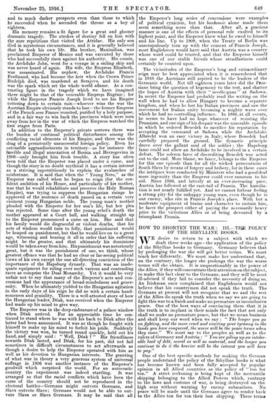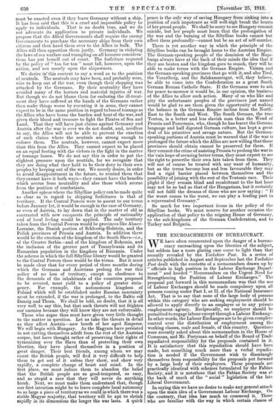HOW TO SHORTEN THE WAR : POLICY OF THE SIBYLLINE
BOOBS.
WE desire to return to a subject with which we dealt three weeks ago—the application of the policy of the Sibylline books to Germany. Germany believes that by prolonging the war she will get better terms. We must teach her differently. We must make her understand that, on the contrary, the longer she prolongs the war the worse terms will she obtain. It is unquestionably in the power of the Allies, if they will concentrate their attention on the subject, to make this fact clear to the Germans, and they will be most ill-advised if they fail to consider the necessity of doing so. An Irishman once complained that Englishmen would not believe that his countrymen did not speak the truth. The Germans at present will not recognize that we and the rest of the Allies do speak the truth when we say we are going to fight this war to a finish and make no premature or inconclusive peace. One of the best ways of convincing them that it is the truth is to implant in their minds the fact that not only shall we make no premature peace, but that we mean business and shall keep our word when we say : " The longer you go on fighting, and the more cruel and exacting your tyranny in the lands you have conquered, the worse will be the peace terms when they come." We must say to the peoples as well as to the rulers of Germany and Austria : " You are piling up an intoler- able load of debt, moral as well as material, and the longer you continue to do it the heavier will be the interest you will have
to Pay."
One of the best specific methods for making the German people understand the policy of the Sibylline books is what has become known and been fully accepted by popular opinion in all Allied countries as the policy of " ton for ton." A strict reckoning is being kept of the mercantile shipping belonging to the Allied Powers which, contrary to the laws and customs of war, is being destroyed on the high seas without warning by enemy submarines. No peace will be made until the Germans agree to render back to the Allies ton for ton their lost shipping. These terms must be exacted even if they leave Germany without a ship. It has been said that this is a cruel and impossible policy to apply to individuals. That is no doubt true, and we do not advocate its application to private individuals. We propose that the Allied Governments shall require the enemy Governments to purchase the necessary ships from their- own citizens and then hand them over to the Allies in bulk. The Allies will then apportion them justly. Germany in violating the laws of sea warfare and trampling on all humane considera- tions has put herself out of court. The forfeiture required by the policy of " ton for ton " must fall, however, upon the nation, and not merely upon the shipowners.
We desire in' this context to say a word as to the position of neutrals. The neutrals may have been, and probably were, wise to keep out of the war, even though their shipping was attacked by the Germans. By their neutrality they have avoided many of the horrors and material injuries of war. But though we do not blame them for enduring the ill-treat- ment they have suffered at the hands of the Germans rather than make things worse by resenting it in arms, they cannot expect to be in the same position in regard to loss of tonnage as the Allies who have borne the burden and heat of the war, and given their blood and treasure to fight the Pirates of Sea and Land. That they will have just claims against Germany and Austria after the war is over we do not doubt, and, needless to say, the Allies will not be able to prevent the exaction of such claims where the neutrals are strong enough to enforce them. The neutrals, however, cannot expect more than this from the Allies. They cannot expect to be placed on an equal footing with the victors in the fight in the matter of tonnage losses. We do not say this in order to put the slightest pressure upon the neutrals, for we recognize that they are doing what they hold to be their duty to their own peoples by keeping out of the war. We merely desire, in order to avoid disappointment in the future, to remind them that they cannot have it both ways—they cannot have the benefits which accrue from neutrality and also those which accrue from the position of combatants.
Another sphere where the Sibylline policy can be made quite as clear as in regard to shipping forfeitures is that of territory. If the Central Powers were to assent to our terms before January 1st, it would be enough in the case of Germany, or even of Austria, to lay down that in the matter of old as contrasted with new conquests the principle of nationality and of local feeling would be applied. The only territory taken from the Central Powers would be provinces like Alsace- Lorraine, the Danish portion of Schleswig-Holstein, and the Polish provinces of Prussia and Austria. In addition there would be the erection of the kingdom of the South Slays—i.e., of the Greater Serbia—and of the kingdom of Bohemia, and the inclusion of the greater part of Transylvania and its Rumanian population in the kingdom of Rumania. Under the scheme in which the full Sibylline library would be granted to the Central Powers these would be the terms. But it must be made clear that for every period of three months during which the Germans and Austrians prolong the war this policy of no loss of territory, except in obedience to the demands of the inhabitants of the countries proposed to be severed, must yield to a policy of greater strin- gency. For example, the autonomous kingdom of Poland which will be established under Russian suzerainty must be extended, if the war is prolonged, to the Baltic yid Danzig and Thorn. We shall be told, no doubt, that it is all very well to say this, but that such threats will not frighten our enemies because they will know they are not enforceable. Those who argue thus must have given very little thought to the matter in question. Let us take the threats in detail as they affect Austria—now bereft of her aged Emperor. We will begin with Hungary. As the Magyars have persisted in not cutting themselves adrift from the rest of the Austrian corpse, but have thought rather of preserving their rights of tyrannizing over the Slava than of protecting their own liberties, they have placed themselves in a position of great danger. Their best friends, among whom we may count the British people, will find it very difficult to help them to get out of it unless they show, and show very rapidly, a complete change of heart and mind. In the first place, we must induce them to abandon the belief that the British people are so good-tempered, so easy, and so stupid a race that they will never do anything harsh. Next, we must make them understand that, though our fiist intention might be to leave complete local autonomy to as large a piece of territoryas we could in which there was a stable Magyar majority, that territory will be apt to shrink rapidly in its dimensions the longer the war lasts. A quick peace is the only way of saving Hungary from sinking into' a position of such impotence-as will well-nigh break the hearts of her proud people. We shall be sorry to see Hungary commit suicide, but her people must learn that the prolongation of the war and the burning of the Sibylline books cannot but affect them profoundly—cannot but be an act of self-murder.
There is yet another way in which the principle of the Sibylline books can be brought home to the Austrian Empire. The German-speaking people of the dominion of the Haps- burgs always have at the back of their minds the idea that if they are beaten and the kingdom goes to smash, they will be able to make terms with the German Empire. Vienna and the German-speaking provinces that go with it, and also Tirol, the Vorarlberg, and the Salzkammergut, will, they believe, be able to come into the Confederation as a great South German Roman Catholic State. If the Germans were to ask for peace to-morrow it would be, in our opinion, the business of the Allies to allow such action. Many of us who like and pity the unfortunate peoples of the provinces just named would be glad to see them given the opportunity of making the balance in the German Empire incline from the North- East to the South and West. The South German, the true Teuton, is a better and less slavish man than the Wend of Prussia and Pomerania, who, though he has learnt the German language and half digested German culture, has kept a great deal of his primitive and savage nature. But the German- speaking portions of Austria must be warned that if the war is prolonged the future which the Allies are now willing that those provinces should obtain cannot be preserved for them. If they commit the crime of assisting Prussia to prolong the war in the vain hope of securing better terms, they must expect to see the right to prescribe their own fats taken from them. They will not of course be treated with any want of humanity, but as the terms become less and less favourable they may find a rigid barrier placed between themselves and the possibility of joining with the rest of the Teutonic race. Their plight if they remain blind and recalcitrant to the last hour may not be so bad as that of the Hungarians, but it certainly will not fulfil the dreams of those who are now saying : " If the worst comes to the worst, we can play a leading part in a rejuvenated Germany."
So much for two important items in the policy of the Sibylline books. We must reserve for another occasion the application of that policy to the reigning. House of Germany, to the sub-kingdoms of the German Confederation, and to Turkey and Bulgaria.



































 Previous page
Previous page